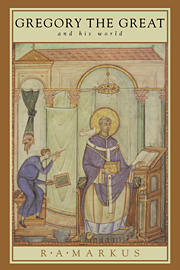Book contents
- Frontmatter
- Contents
- Preface
- List of abbreviations
- Maps
- 1 Introduction: a contemplative in a troubled world
- 2 Integritas animi: ministry in the Church
- 3 Sapienter indoctus: scriptural understanding
- 4 Appropinquante mundi termino: the world in its old age
- 5 The Christian community and its neighbours
- 6 Christiana respublica: within the confines of the Empire
- 7 Terra mea: Italy between two worlds
- 8 Argus luminosissimus: the pope as landlord
- 9 Scissum corpus: the schism of the Three Chapters
- 10 Ravenna and Rome: and beyond
- 11 In cunctis mundipartibus: the far West
- 12 Inconcussam servare provinciam: dissent in Africa
- Epilogue
- Appendix On the distribution of Gregory's correspondence
- Glossary of terms for offices
- Sources
- Secondary works referred to
- Index of Gregorian texts
- General index
2 - Integritas animi: ministry in the Church
Published online by Cambridge University Press: 05 June 2012
- Frontmatter
- Contents
- Preface
- List of abbreviations
- Maps
- 1 Introduction: a contemplative in a troubled world
- 2 Integritas animi: ministry in the Church
- 3 Sapienter indoctus: scriptural understanding
- 4 Appropinquante mundi termino: the world in its old age
- 5 The Christian community and its neighbours
- 6 Christiana respublica: within the confines of the Empire
- 7 Terra mea: Italy between two worlds
- 8 Argus luminosissimus: the pope as landlord
- 9 Scissum corpus: the schism of the Three Chapters
- 10 Ravenna and Rome: and beyond
- 11 In cunctis mundipartibus: the far West
- 12 Inconcussam servare provinciam: dissent in Africa
- Epilogue
- Appendix On the distribution of Gregory's correspondence
- Glossary of terms for offices
- Sources
- Secondary works referred to
- Index of Gregorian texts
- General index
Summary
THE CONTEMPLATIVE AND THE ACTIVE LIFE
Questions about the relations between the two lives were almost as old as Christianity itself, and some of them older. Gregory had a venerable tradition of Christian thought to draw upon, and behind that tradition stood a rich quarry of Jewish ideas and of Greek philosophical reflection. How much of this quarry Gregory mined for himself we cannot know. Usually he covers his tracks so well as to expunge all identifiable traces of his sources. Their language and their concepts have soaked into his mind to re-emerge subtly transformed, sometimes scarcely recognisable, but always as his own. In Augustine and Cassian – both of whom he had read in great amounts – he would have found the most important threads that he wove into the fabric of his own, and, as we shall see, very personal, reflection on contemplation and the active life.
Ancient though the dichotomy was between the two forms of life, the ‘active’ (or ‘practical’, as it was more often called in the Greek world) and the ‘contemplative’ (or ‘theoretical’), the meaning of the terms and the nature of the tension between the two things they stood for had undergone some profound changes. Origen had been the fountainhead – as for so many things – for the use made by Christian writers of the contrast drawn by ancient Greek philosophers between the two lives. For Origen, the practical was a step on the ladder of perfection: the moral discipline prepared one for the higher stage, contemplation.
- Type
- Chapter
- Information
- Gregory the Great and his World , pp. 17 - 33Publisher: Cambridge University PressPrint publication year: 1997



